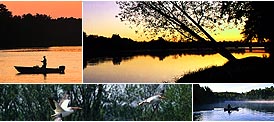

Alligator Hunting: A One of a Kind Experience -
Why They Call it Hunting Instead of Killing -
Florida's Other Crab - by Kris Thoemke
The Waiting Game - by Kris Thoemke
Mounted Memories - by Kris Thoemke
Eco-Touring in Collier County - by Kris Thoemke
Beyond the Largemouth Bass - by Kris Thoemke
Tying One On -- Some thoughts on how to get started tying your own flies -- by Kris Thoemke
The Big Cypress: Adventures in a Vast Wilderness
A Basic Guide to Saltwater Fly Fishing in Southwest Florida -- by Don Phillips
Four Strokes on the Water -- The sound of the future for marine outboards is likely to be much quieter --
Birding Big Cypress Swamp and the 10,000 Islands --
Recycling Your Fish -- by Kris Thoemke
Peace, Paddle and Hunt -- by Kris Thoemke
by Kris Thoemke
by Kris Thoemke
-- Kris Thoemke spends the day exploring the Big Cypress National Preserve with Preserve biologist Debra Jansen
by Kris Thoemke
by natural history writer and photographer Jeff Ripple
Recycling Your Fish
by Kris Thoemke
Fishing in Florida is vastly more complicated today than it was twenty five years ago. Salt water
fishing, in particular, has undergone the most changes. A myriad of open and closed seasons,
bag limits and slot limits combined with confusing rules about who needs a salt water fishing
license adds a new challenge to this popular past time; enjoying a day on the water without
breaking the law.
Even with all the recent restrictions facing anglers, the fate of some species remains in peril.
Serious anglers know that more effort is necessary. The response that some anglers have to this
concern is to practice catch and release fishing.
Actually, anyone who fishes in salt water needs to know how to safely release fish. While the
government doesn't technically require catch and release fishing by law, if you catch a snook or
redfish out of season, you must return the fish to the water, live or dead. To increase your
chances of releasing a fish that you've caught in the shallow back waters, here are some
suggestions.
Your success in this endeavor begins before you even catch the fish. One of the most effective
actions you can take is to use a barbless hook. Because they are not legally required anywhere in
Florida, finding them in the tackle shops might be hard. But, you can make a barbed hook
basically barbless by pinching the barb down with a pair of pliers or filing it down with a small
file. This makes the hook easier to remove once you get the fish to you.
When a fish swallows the hook it can be difficult to remove it and keep the fish alive. To reduce
the incidence of swallowed hooks, set the hook quickly when the fish bites. If the hook is
swallowed, a barbless hook is usually easier to remove.
If removing the hook looks lie it will cause too much damage, cut your line as close to the hook
as possible and leave the it in the fish. Unless you're using stainless steel hooks, there's a chance
the hook will rust away in a few days to a few weeks. If you are concerned about this problem,
make sure that you buy hooks made of a metal that will quickly break down in the water.
Once you get the fish to the boat or the shore, leave it in the water. Ideally you should use a hook
removing tool. With one of these all you do is grab your line, and use the tool to get the hook
out. Handling the fish removes the slimy covering on fish, a coating that protects the fish from
infections.
If you must handle the fish, use a gloved hand or a wet towel to grab the fish. Avoid a landing
net if possible. Keep your fingers off the fish's gills and eyes. Remove the hook and get the fish
back in the water as quick as possible. If you want a picture, do it quickly.
When you are ready to release the fish place it carefully in the water. Don't toss it back in with a
splash. Hold the fish gently from underneath and by the tail. Wait for the fish to swim away
from you.
After a prolonged fight, fish can be exhausted and unable to swim. If the fish is weak or
lethargic and can't swim away under its own power, gently resuscitate it by slowly moving it back
and forth in the water to force water through its gills. Some anglers that I know have spent a half
an hour or more helping a big snook or tarpon recover for the battle. Every one of them says that
it was time well spent.
More and more anglers are practicing catch and release fishing even if the fish are in season and
of legal size. There is an encouraging trend for anglers to keep one or two fish for dinner and
release the others caught that day.
Anglers doing this realize that fish are a valuable resource and for there to be a future in
sportfishing, enough fish must survive to reproduce.
NOTE: Off-shore anglers that bring fish up from deep water may have to contend with distended air bladders. Fish have these organs to control their buoyancy under water. When an angler brings a fish to the surface too fast the bladder distends and bloats the fish. Before releasing a fish with an expanded air bladder, use a pin, sharp hook, or for very large fish an ice pick, and puncture the air bladder. If you don't do this the fish will be unable to return to the deep water it came from and it will most likely die. Watch this site for an upcoming story on how to deal with fish caught in deep waters.












